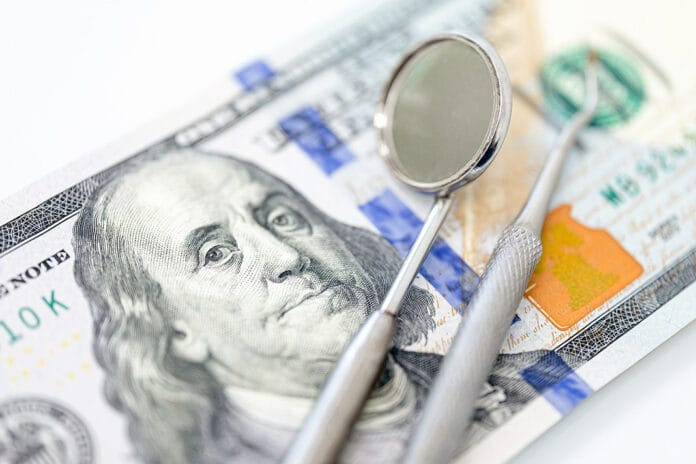A shortage of dental hygienists has led to some discord between dental hygienists and dentists, mainly focusing on wages. Both sides have important observations to make, but an easy and reasonable solution will leave hygienists satisfied with pay rates and dentists comfortable with the wages paid to dental hygienists.
The first step for dental hygienists is to know their worth.
Know Your Worth
Knowing your worth is the simplest and most effective solution to being underpaid. This requires a little bit of math, but you can easily determine what your average wage should be with a simple equation. The first step is to track your production for several months. This can be previous production, future production, or even a combination of both, and then determine what 33% of that production equates to hourly.
The industry standard is that hygienists should be paid between 30% and 35% of their production. This leaves room for raises and other benefits the practice may offer. (Alabama hygienists, I’m looking at you. You have had the lowest wages in the country for years. It’s time to evaluate your worth.)
On the flip side, if you determine you are being paid more than this average, you are likely being overpaid. I am not implying you should get a reduction in pay. I simply want all hygienists to be aware of where they may fall on this spectrum. Being paid more than the industry standard can put a lot of stress on the practice and practice owner, so be aware of your position and make a solid effort to bring more to the practice than just production. This can be done by making efforts to fill the schedule or assisting other hygienists and dental assistants. In short, being an all-around team player.
I know health care providers don’t like to consider the business side of health care, but, unfortunately, every health care provider is also a business, at least in the United States. This doesn’t mean we alter our standard of care by pushing unnecessary treatments or products by any means. I only mention this aspect because it is important to understand that there can be no money going out if there is no money coming in.
Additionally, more money going out than coming in equates to a failed business, and if you think you were getting underpaid before, imagine not getting paid at all when the practice fails.
Don’t Price Yourself Out of a Job
I can’t definitively pinpoint when the hygiene shortage began, but it seems to correlate with the pandemic. Some hygienists saw this shortage as an opportunity to manipulate wages and request wages that were completely unreasonable.
This is not what we want to do. Though the hygiene shortage has provided a unique opportunity for hygienists to demand fair wages or find practices that treat them well and respect their position, it is not an opportunity to demand unreasonably high wages. Again, by tracking production, you can also use that information when negotiating raises. As fees increase in the practice, this could warrant a raise to stay within the 30-35% range of pay based on production.
Additionally, avoid asking about wages on social media, as many circumstances can vary. For instance, someone may comment and report a rate well below what you deserve. Or, the opposite: A completely unreasonable rate for the practice you are employed with or looking to gain employment.
The same can be said about “salary surveys” that you may find online. Just because someone reports what their wage is in a survey doesn’t mean it’s an accurate representation of where they live, where you live, or in the sweet spot of 30-35% of their production.
Wages vary not only state by state but city by city, making the cost of living influence fair wages. For instance, the cost of living in Los Angeles, California, is most likely greater than the cost of living in rural Montana. Occupational wage breakdowns can be found on state employment websites.3 These breakdowns often give the lowest 10% of wage ranges to the highest 90% of wage ranges and the average for specific areas in the state. The ultimate goal is a fair wage for you!
When Employers Consider Other Options
By demanding unreasonable wages, hygienists are pricing themselves out of a job. Keep in mind our profession is regulated by dentists. In a recent push initiated by dentists in Illinois, legislation was passed to allow assistants to scale patients 19 years of age and younger with as little as 32 hours of training.1
Another example that allows assistants to provide full dental hygiene care is the Alabama Dental Hygiene Program. This program allows on-the-job training with minimal didactic coursework and almost no basic science background. Through this program, assistants with two years of working experience can apply and become licensed hygienists in as little as nine months.2
Granted, these hygienists cannot practice in any other state and are required to take state boards, but national boards are not required. Nonetheless, I fear this is what will replace highly educated dental hygienists if these wage wars continue.
Dentists could push for this type of training instead of a college education. They can and will cite the hygiene shortage as a reason to enact legislation and programs like the ones previously mentioned. As a matter of fact, the hygiene shortage and lack of access to care are the very reasons these programs exist. The bottom line is don’t give them a reason to push for these programs and legislation.
In Closing
As we all navigate this difficult time with a hygiene shortage that has contributed to understaffing and a wage war that will never be won, I implore you to better understand your personal worth.
If you are being underpaid, please have a conversation with your office manager or dentist and present the evidence you need to acquire a fair wage. If you are in the market to secure a position, please be reasonable with your asking wage. Request a 90-day review, at which time you can see your production and discuss a fair wage if you are, indeed, being underpaid.
Mutual respect is the goal. This requires dentists to offer fair wages and hygienists to accept fair wages rather than being underpaid or demanding unreasonably high wages.
Now Check Out the Peer-Reviewed, Self-Study CE Courses from Today’s RDH!
Listen to the Today’s RDH Dental Hygiene Podcast Below:
References
- Bill Status of HB4501. (2022, May 27). Illinois General Assembly. https://www.ilga.gov/legislation/BillStatus.asp?DocNum=4501&GAID=16&DocTypeID=HB&SessionID=110&GA=102
- Alabama Dental Hygiene Program: Dentist-Instructor/Student Manual. (2022). Board of Dental Examiners of Alabama. http://www.dentalboard.org/wp-content/uploads/2022/02/22-23-Dentist-Instructor-Student-Manual-ADHP-2022-2023.pdf
- Occupational Profiles: Dental Hygienists Oregon. (2021). State of Oregon Employment Department. https://www.qualityinfo.org/oprof?occProfSearchTerm=dentalhygienist












